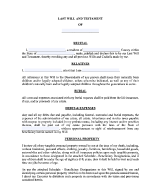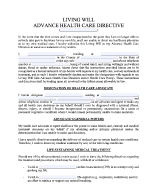
A Last Will and Testament is a legally recognized document that expresses a person's wishes once they pass away. This is a well-detailed and organized document that not only names an executor of an estate (which is the person charged with carrying out the instructions given by the Testator) but will also detail what will happen to all of their assets, and personal property, and will even describe what they wish to be done to their body, as well as any funeral or repass arrangements.
A last will and testament is a key element of an estate plan that ensures that a person's estate will be handled as they wish. If any form of disagreement occurs between the beneficiaries, or if the will is challenged by someone not named in the will, this document can be taken to court in which it will be examined and used as evidence of the Testator's true last wishes. Not having a last will can lead to a tumultuous process for loved ones. If a Testator dies without a will, the state becomes the executor of his or her estate. This means that the state will determine how to distribute the Testator's property and who will receive assets first, even going so far as to allocating the Testator's children. Last will and testament documents are vital tools for carrying out the last wishes of a person before their passing and ensuring that everything from their assets and property to their children is taken care of with as little legal interference as possible.

A Living Will is a document that you would use to declare your healthcare wishes in the event that you fall into an incapacitated state and cannot speak for yourself. In this event, doctors, healthcare professionals, and loved ones will use your living will as a guide to provide the care and comfort you want, and avoid the treatments and procedures you don't. These documents may cover a variety of areas of care that include anything from general instruction to specific treatments that you may or may not want, and can be vital to prolonging your life should you fall into an incapacitated state, or end any life support (if you wish).
Your living will may cover whether or not you wish to receive life treatments that may prolong your life and treat any injuries that you may have. These treatments may include things like blood transfusions, dialysis, surgery, certain drugs, and even CPR. Living Wills can also go describe whether or not you wish to receive treatments such as a feeding tube or hydration tube and even orders like Do Not Resuscitate Orders.

A Power of Attorney (sometimes referred to as a POA) is a type of document that allows a person to appoint a person they trust to manage affairs on their behalf. In these situations, the person who is conveying responsibility to another is often referred to as the "Principal" while the person they appoint to carry out these responsibilities is often referred to as the "Attorney-in-Fact" or the "Agent". There are various types of power of attorney documents, each of which serves a different purpose. The type of power of attorney document used will determine the responsibilities that the Agent will hold and will also determine when these responsibilities come to an end. For example, a non-durable power of attorney will become void if the Principal falls into an incapacitated state, while durable power of attorney documents will remain in effect.
With the fact that there are a variety of power of attorney documents that a Principal may use, each state carries a different set of laws and requirements for each particular type of document. For example, some documents may require the signature of the Principal plus two competent witnesses, while other documents require notarization from a state-certified notary public. When using any kind of power of attorney, it is important to ensure that you adhere to the document's specific signing requirements.